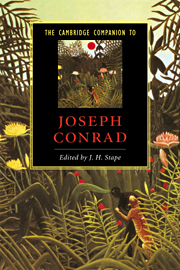7 - Under Western Eyes
Published online by Cambridge University Press: 28 May 2006
Summary
Conrad's most succinct and compelling statement about the interdependence of the artist's and of humanity's concerns is contained in a letter to The New York Times of 2 August 1901: 'The only legitimate basis of creative work lies in the courageous recognition of all the irreconcilable antagonisms that make our life so enigmatic, so burdensome, so fascinating, so dangerous – so full of hope' (Letters, II, pp. 348-9). All his major fictions present, explore, and are constructed out of antagonisms that are never finally resolved. These famously include: egoism and altruism, emotion and reason, solidarity and isolation, moral corruption and redemption, heroism and contingency, loyalty and betrayal, idealism and scepticism, piety and scorn, and fidelity to a code composed of 'a few very simple ideas' and 'truth to one's own sensations' (PR, p. xix). Conrad's recognition, in the same letter, of a ceaseless 'struggle of contradictions' springs from an inclusive vision of man's fate, and because for him, as for Flaubert, 'the whole of the truth lies in the presentation', his vision sponsors a restless search for a correlative form (Letters, II, p. 200).
- Type
- Chapter
- Information
- The Cambridge Companion to Joseph Conrad , pp. 122 - 139Publisher: Cambridge University PressPrint publication year: 1996
- 5
- Cited by

